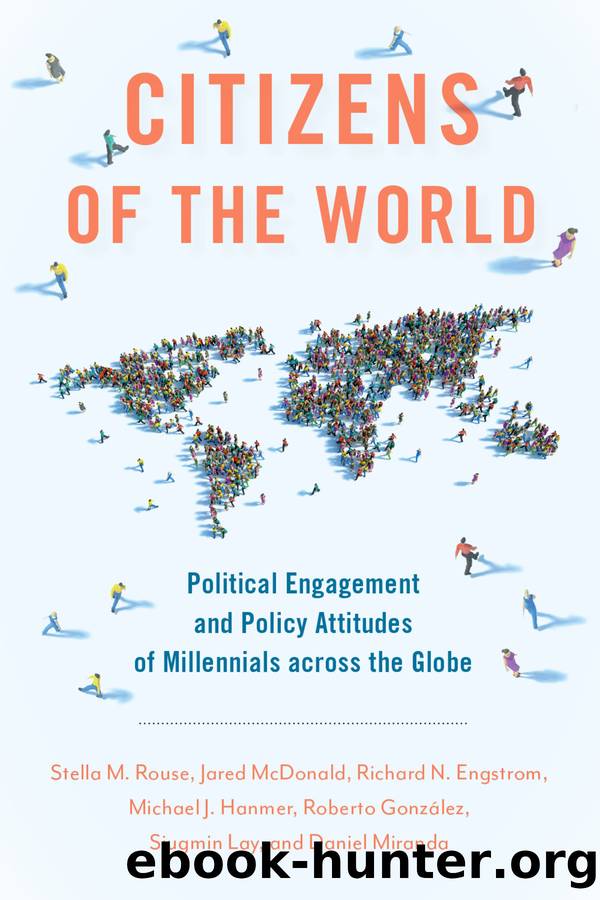Citizens of the World by unknow

Author:unknow
Language: eng
Format: epub
Publisher: Oxford University Press USA
Published: 2022-02-15T00:00:00+00:00
Perceived Importance of Different Forms of Political Participation
Last, but not least, we discuss the importance that Millennials and non-Millennials attribute to several forms of political participation. The importance that respondents attribute to these behaviors could reflect the extent to which they value democracy as a fundamental political system. Specifically, we investigate how important it is for Millennials and non-Millennials to vote in local and national elections, to engage in political activities aimed at changing local and national conditions, and to join local and national political organizations.
We reason that the perceived importance of these political behaviors is linked to the notion of good citizenship, which considers political participation a norm that shapes attitudes and behavior (Bolzendahl and Coffé 2009; Coffé and van der Lippe 2010; Jennings 2015). As previously noted, Dalton (2015) delineates two types of normsâduty-based citizenship and engaged citizenshipâto explain differences in political participation among younger and older generations. Duty-based norms correspond to traditional forms of participation in politics, such as voting, paying taxes, and respecting the lawâin other words, activities aimed at reinforcing existing political authority and order (Dalton 2015). If people are more likely to support duty-based norms, they will be much more willing to engage in the act of voting (Van Deth 2007) and be less likely to participate in nonconventional forms of political activity (Bolzendahl and Coffé 2013; Dalton 2015). These duty-based norms generally tend to be more common in older adults. Engaged citizenship corresponds to norms that are aimed at promoting social change and reducing inequalities. Those who embrace engagement-based norms participate more often in volunteerism, boycotts, demonstrations, and other forms of contentious actionsâactivities that emphasize more direct participation of government and policy (Rouse and Ross 2018). Young people hold stronger engagement-based norms than duty-based norms when compared to older groups (Dalton 2015; Rouse and Ross 2018).
We examine Millennialsâ and non-Millennialsâ preferences for forms of political participation. The findings described earlier in this chapter suggest that Millennials may be less likely to attribute importance to voting, since they reported lower levels of voting behavior. However, the opposite may emerge regarding the importance they attribute to being engaged citizens. As portrayed in Figure 4.7a and consistent with earlier results, participants from all countries attributed much importance to voting, expressing values above the midpoint (5.5) of the 1â10 scale.
Download
This site does not store any files on its server. We only index and link to content provided by other sites. Please contact the content providers to delete copyright contents if any and email us, we'll remove relevant links or contents immediately.
Kathy Andrews Collection by Kathy Andrews(10519)
The remains of the day by Kazuo Ishiguro(7551)
Spare by Prince Harry The Duke of Sussex(4195)
Paper Towns by Green John(4169)
The Body: A Guide for Occupants by Bill Bryson(3801)
Be in a Treehouse by Pete Nelson(3212)
Harry Potter and the Goblet Of Fire by J.K. Rowling(3045)
Goodbye Paradise(2963)
Never by Ken Follett(2880)
Into Thin Air by Jon Krakauer(2701)
The Remains of the Day by Kazuo Ishiguro(2618)
The Genius of Japanese Carpentry by Azby Brown(2609)
The Cellar by Natasha Preston(2595)
Drawing Shortcuts: Developing Quick Drawing Skills Using Today's Technology by Leggitt Jim(2532)
120 Days of Sodom by Marquis de Sade(2438)
Architecture 101 by Nicole Bridge(2350)
The Man Who Died Twice by Richard Osman(2298)
Machine Learning at Scale with H2O by Gregory Keys | David Whiting(2291)
Fairy Tale by Stephen King(2069)
